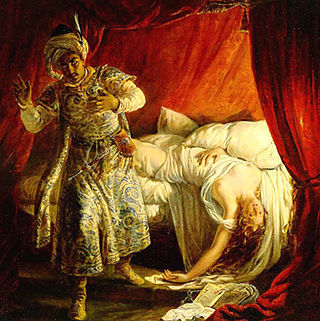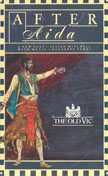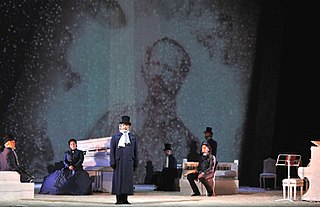See also
- "Marcia trionfale", the second Vatican national anthem
- "Marș triumfal", the first Romanian national anthem
A triumphal march is a musical form generally reflecting a triumph, victory or great joy.
Many composers have written a triumphal march, with maybe the best known one being by Italian opera composer, Giuseppe Verdi for his 1871 grand opera, Aida , where, in the second act, Radames leads the Egyptian army on its return following their victory over the Ethiopians. The triumphal scene gives directors the opportunity for elaborate spectacle typical of the grand opera of the period in the nineteenth century.
It is often played during graduation ceremonies in Latin America [1] and the Philippines which is also called the Martsang Pandangál (Filipino for "Honours March") which is an excerpt from Verdi's march. [2] The piece is also one of three compositions (the other two being the Spanish anthem Marcha Real and the French anthem La Marseillaise ) that influenced the Philippine National Anthem, according to its composer, Julián Felipe. [3] Verdi's triumphal march has also become the background of many a popular football chant, especially in his native Italy.
Among other composers who have composed triumphal marches are Ludwig van Beethoven, Edward Elgar, Edvard Grieg and Alfred Hollins. Alexander Glazunov's is known as the "Triumphal March on the Occasion of the Worlds Columbian Exposition in Chicago, 1893".

Giuseppe Fortunino Francesco Verdi was an Italian composer best known for his operas. He was born near Busseto to a provincial family of moderate means, receiving a musical education with the help of a local patron. Verdi came to dominate the Italian opera scene after the era of Gioachino Rossini, Vincenzo Bellini, and Gaetano Donizetti, whose works significantly influenced him.

Falstaff is a comic opera in three acts by the Italian composer Giuseppe Verdi. The Italian-language libretto was adapted by Arrigo Boito from the play The Merry Wives of Windsor and scenes from Henry IV, Part 1 and Part 2, by William Shakespeare. The work premiered on 9 February 1893 at La Scala, Milan.

Aida is an opera in four acts by Giuseppe Verdi to an Italian libretto by Antonio Ghislanzoni. Set in the Old Kingdom of Egypt, it was commissioned by Cairo's Khedivial Opera House and had its première there on 24 December 1871, in a performance conducted by Giovanni Bottesini. Today the work holds a central place in the operatic canon, receiving performances every year around the world; at New York's Metropolitan Opera alone, Aida has been sung more than 1,100 times since 1886. Ghislanzoni's scheme follows a scenario often attributed to the French Egyptologist Auguste Mariette, but Verdi biographer Mary Jane Phillips-Matz argues that the source is actually Temistocle Solera.
A baritone is a type of classical male singing voice whose vocal range lies between the bass and the tenor voice-types. The term originates from the Greek βαρύτονος (barýtonos), meaning "heavy sounding". Composers typically write music for this voice in the range from the second F below middle C to the F above middle C (i.e. F2–F4) in choral music, and from the second G below middle C to the G above middle C (G2 to G4) in operatic music, but the range can extend at either end. Subtypes of baritone include the baryton-Martin baritone (light baritone), lyric baritone, Kavalierbariton, Verdi baritone, dramatic baritone, baryton-noble baritone, and the bass-baritone.

"Lupang Hinirang", originally titled in Spanish as "Marcha Nacional Filipina", and commonly and informally known by its incipit "Bayang Magiliw", is the national anthem of the Philippines. Its music was composed in 1898 by Julián Felipe, and the lyrics were adopted from the Spanish poem "Filipinas", written by José Palma in 1899.

Otello is an opera in four acts by Giuseppe Verdi to an Italian libretto by Arrigo Boito, based on Shakespeare's play Othello. It was Verdi's penultimate opera, first performed at the Teatro alla Scala, Milan, on 5 February 1887.

Arrigo Boito was an Italian librettist, composer, poet and critic whose only completed opera was Mefistofele. Among the operas for which he wrote the libretti are Giuseppe Verdi's last two monumental operas Otello and Falstaff as well as Amilcare Ponchielli's La Gioconda.

Teatro Regio di Parma, originally constructed as the Nuovo Teatro Ducale, is an opera house and opera company in Parma, Italy.

Francesco Maria Piave was an Italian opera librettist who was born in Murano in the lagoon of Venice, during the brief Napoleonic Kingdom of Italy.

Grand opera is a genre of 19th-century opera generally in four or five acts, characterized by large-scale casts and orchestras, and lavish and spectacular design and stage effects, normally with plots based on or around dramatic historic events. The term is particularly applied to certain productions of the Paris Opéra from the late 1820s to around 1860; 'grand opéra' has sometimes been used to denote the Paris Opéra itself.

Macbeth is an opera in four acts by Giuseppe Verdi, with an Italian libretto by Francesco Maria Piave and additions by Andrea Maffei, based on William Shakespeare's play of the same name. Written for the Teatro della Pergola in Florence, it was Verdi's tenth opera and premiered on 14 March 1847. Macbeth was the first Shakespeare play that Verdi adapted for the operatic stage. Almost twenty years later, Macbeth was revised and expanded in a French version and given in Paris on 19 April 1865.

Francesco (Franco) Antonio Faccio was an Italian composer and conductor. Born in Verona, he studied music at the Milan Conservatory from 1855 where he was a pupil of Stefano Ronchetti-Monteviti and, as scholar William Ashbrook notes, "where he struck up a lifelong friendship with Arrigo Boito, two years his junior" and with whom he was to collaborate in many ways.

Sarasota Opera is a professional opera company in Sarasota, Florida, USA, which was founded as the Asolo Opera Guild and, until 1974, presented a visiting company's productions. Between 1974 and 1979, it set about mounting its own productions in the same venue until, in 1979, it acquired the Edwards Theatre, which became the Sarasota Opera House in 1984. The house underwent a further renovation in 2008, creating a 1,119-seat venue.

Jérusalem is a grand opera in four acts by Giuseppe Verdi. The libretto was to be an adaptation and partial translation of the composer's original 1843 Italian opera, I Lombardi alla prima crociata. It was the one opera which he regarded as the most suitable for being translated into French and, taking Eugène Scribe's advice, Verdi agreed that a French libretto was to be prepared by Alphonse Royer and Gustave Vaëz, who had written the libretto for Donizetti's most successful French opera, La favorite. The opera received its premiere performance at the Salle Le Peletier in Paris on 26 November 1847. The maiden production was designed by Paul Lormier (costumes), Charles Séchan, Jules Diéterle and Édouard Desplechin, and Charles-Antoine Cambon and Joseph Thierry.

Teresa Stolz was a Czech spinto soprano, long resident in Italy, who was associated with significant premieres of the works of Giuseppe Verdi, and may have been his mistress. She has been described as "the Verdian dramatic soprano par excellence, powerful, passionate in utterance, but dignified in manner and secure in tone and control".

After Aida is a 1985 play-with-music by Julian Mitchell. It is about Giuseppe Verdi, and the pressure put upon him after his attempt to retire from composing. Continued insistent prodding from his friends eventually results in one of his greatest masterpieces, the opera Otello, which premiered in 1887.

Risorgimento! is an opera in one act by Lorenzo Ferrero set to an Italian-language libretto by Dario Oliveri, based on a scenario by the composer. It was completed in 2010 and first performed at the Teatro Comunale Modena on 26 March 2011.
Sigutė Stonytė is a Lithuanian soprano and professor at the Lithuanian Academy of Music and Theatre.

Inno delle nazioni, a cantata in a single movement, is one of only two secular choral works composed by Giuseppe Verdi. This Hymn incorporates "God Save the King", "La Marseillaise", and "Il Canto degli Italiani". It was the first collaboration between the composer and Arrigo Boito, who, much later, would revise the libretto of Simon Boccanegra and write the original libretti of Otello and Falstaff.
Markella Hatziano is an operatic mezzo-soprano born in Athens, Greece.